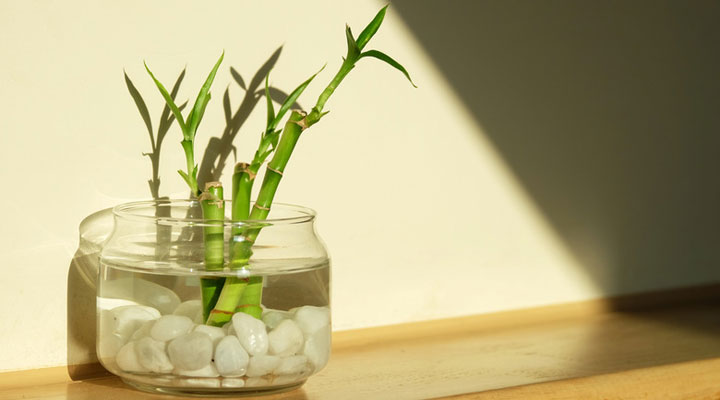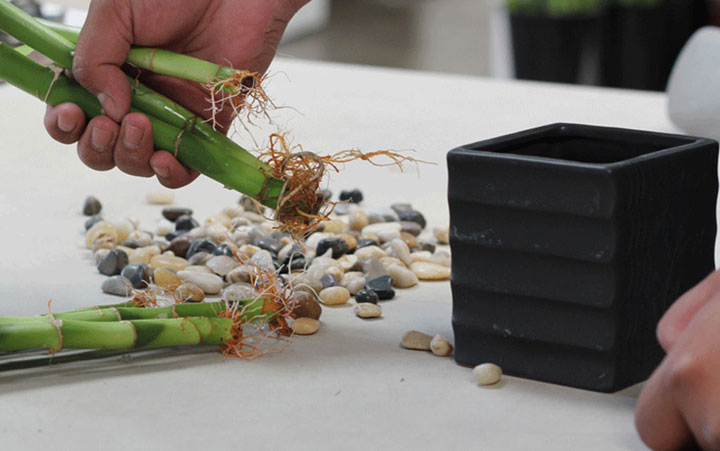bamboo plant; Storage conditions in water and soil + common diseases

The bamboo plant is one of the most popular and beautiful indoor plants. Of course, this lovely plant also grows well outside the house. According to feng shui, the bamboo plant is one of the plants that are suitable for placing in homes and offices. The only drawback of popular bamboo is that it is toxic to pets such as dogs and cats. In this article, we talk about the bamboo plant in detail. Stay with us.
Characteristics of the bamboo plant
| common name | Bamboo is a plant of wealth |
|---|---|
| scientific name | Dracaena sanderiana |
| Family | Asparagaceae |
| Plant type | Perennial shrub |
| Size of mature plant | 30 cm to 1.5 m high, 30 to 60 cm wide (indoors) |
| others | partial sun (moderate) |
| Soil type | Moist soil with good drainage |
| pH | acidic |
| Blooming time | Autumn and winter (does not bloom indoors) |
| flower color | white |
| Native region | Africa |
| including | It is toxic to animals |
Keeping bamboo in water
The bamboo plant is susceptible to chlorine and other chemicals in tap water. If you want to use tap water to water the plant, let the water sit for 24 hours, and the chlorine evaporates, then pour it over the plant.
Add water to the pot every 2 to 7 days if needed. It is also necessary to completely change the water every 2-3 months. Still, if you notice it smells terrible, you can do it sooner. For example, if the plant grows in a pot full of pebbles, change the water every week to prevent the plant from getting sick and smelling. Make sure the water always covers the roots.
Keeping bamboo in the soil
Bamboo plants can be grown in excellent and rich potting soil. The soil of this plant should be kept moist but not wet. Pay attention to soil drainage. Excellent and proper drainage will strengthen the bamboo and make it fresh.
Bamboo plant maintenance conditions
1. others
Bamboo prefers bright, filtered light, such as under the canopy of a rainforest. Avoid exposing the bamboo plant to direct sunlight because it cannot tolerate this light, and its leaves will burn. However, if the plant begins to stretch or the green color fades, provide it with more light. Rotate the plant regularly so that uniform light reaches all its parts.
2. Temperature and humidity
The bamboo plant prefers a temperature of 18 to 32 degrees Celsius. Avoid placing the plant near cold air currents, in front of air conditioners, heating vents, or windows. Moderate humidity is suitable for your beautiful bamboo plant.
3. Fertilizer
One drop of liquid fertilizer per month is enough for any bamboo plant. Fertilizers for bamboo plants can also be found in the market.
Plants growing in water should be fed every month using a very weak liquid fertilizer. Healthy bamboo roots are red, so don’t worry if you can see red hearts floating in the glass pot.
4. prune
Despite its complex appearance, the bamboo plant is not pruned like a bonsai tree with plant wire. Pruning all houseplants is an integral part of keeping them healthy. Bamboo is no exception to this rule. Over time, most plants become heavy or tend to lose their shape and require pruning at this time.
It is not good to cut the main stem of bamboo, and you should cut its branches. You can cut the branches 2.5 to 5 cm from the main stem. Soon, new shoots will appear, and the resulting plant will be more fragrant. Dip the cut part of the branch in paraffin to prevent further growth.
5. Suitable container
There should be at least a 2.5 cm distance between the bamboo stems and the edge of the container. This space allows the roots to expand and support the plant. If the plant grows in a large glass pot, ensure the container is tall enough for the bamboo to hold the branches. The water level should be enough to submerge the roots completely.
Bamboo cutting method
You can propagate a bamboo plant at any time using cuttings to make a new plant for yourself or to give as a gift. Follow these steps to take bamboo cuttings:
- Use a sharp, sterile pair of scissors and cut off one of the stems attached to the main stem, trim its leaves, and trim off its extra leaves to expose its growth nodes.
- Place the cutting in a container full of distilled water so that the water completely covers the bottom.
- Keep the water clean and fresh while the red roots grow. After about 30 days, sources should appear.
- Place the stem in a decorative pot with water, pebbles, or moist soil when the roots emerge.
Bamboo plant diseases
Although the bamboo plant does not require special care, there are a few things to consider during its growth. If the bamboo plant withers or dries up, it does not mean you will bring bad luck; it means you did not take good care of it. Diseases of this plant are usually related to the quality of water consumed. Changing the water and using good quality water may solve these problems.
1. Browning of leaf tips
Chlorinated water or water that contains a lot of additives will cause the tips of the leaves to turn brown and dry out the plant over time. Remove affected leaves with sharp, sterile scissors. Remove dead leaves from the water so they don’t rot, as they can introduce bacteria to the plant.
2. Root blackening
The blackening of the roots has many causes. The best action is to quickly removing the black seeds and place the stems in a new water container.
3. Algae
Algae growth in water is usually caused by the plant being placed in a transparent pot, allowing light to penetrate and cause algae growth. Wash the pot with water and mild dishwashing liquid and put the plant back in it. If algae growth is a constant problem for your bamboo plant, placing it in an opaque pot is better.
4. Yellowing of leaves
Yellow bamboo leaves indicate the plant receives too much light or fertilizer.
5. Browning of leaves
Brown leaves indicate dry air or polluted water. You can increase the humidity by spraying water regularly. Also, make sure that the water quality is suitable for the plant.
6. Loosening of stems
They will most likely die if the branches begin to rot or turn black and white. It also means that the roots are dead or dying. Factors such as improper water, fungus, or bacteria contribute to dead stems. Rotten stems threaten any other branches close to them, so the best option is to quickly remove them from the pot, change the water, and change the rocks in the container.
Bamboo plant and Chinese traditions
According to Chinese traditions, the number of bamboo stems is significant, and different arrangements of bamboo have different meanings, for example:
- 2 stems represent love.
- 3 stems indicate happiness, wealth, and long life.
- 5 stems represent balance, peace, harmony, and strength in all areas of life.
- 6 stems represent good luck and wealth.
- 7 stems represent health.
- 8 stems represent growth.
- 9 stems indicate good luck.
- 10 stems represent perfection.
- 21 stems represent a precious blessing.
You will rarely find an arrangement with 4 stems. In the Chinese language, the word “four” is close to “death,” so giving a 4-stem bamboo plant as a gift is considered impolite as if you wish death on the recipient.
Frequently asked questions about the bamboo plant.
– Is it better to grow bamboo in water or soil?
Bamboo grows in water and soil, but if you plant it in a pot with suitable soil, it will be more lush and long-lived. In addition, poor water conditions increase the risk of root rot and algae growth.
Is bamboo a good houseplant?
Bamboo can be grown indoors and outdoors. However, the best conditions for bamboo plant growth are a warm space away from strong sunlight.
How long does a bamboo plant live?
Bamboo lives for 1 to 2 years. However, if you transfer your plant to a pot with suitable soil, you can expect it to live a few more years.
– What is the price of a bamboo plant?
There are different types of bamboo, and its price depends on the type of plant.
you say
In this article, you read what bamboo is and its maintenance conditions. Have you ever cared for a bamboo plant? We are eager to read your valuable comments and experiences about this plant.








